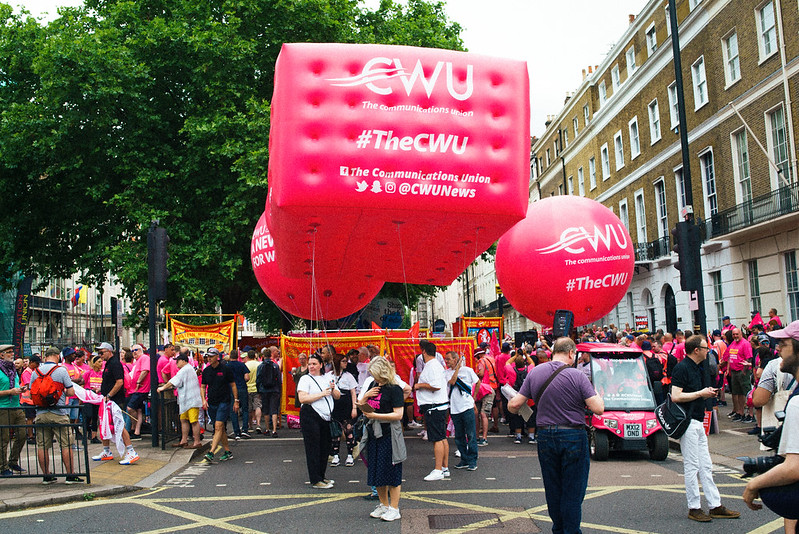After a bitter dispute, which included 18 days of strike action in 2022 and a scorched-earth approach from Royal Mail group, the Communications Workers Union and Royal Mail Group finally thrashed out a deal. Namely the ‘Business Recovery, Transformation, and Growth Agreement’, which the CWU executive were able to steer through a tortuous ballot of the membership.
This agreement contains many of the changes to working practices that Royal Mail Group were trying to push through, but with some key alterations put in by the CWU. For instance, CWU were able to preserve some of the sick-pay entitlement for employees with over a year’s length of service and accept that letters are in long-term decline. There is a tendency for the coverage of industrial disputes to fade away once the industrial action has stopped, even though what comes directly after the action is often the most important part, such is the case with the Royal Mail dispute.
Essentially, this deal is a truce, albeit an unequal one as it opens new and discrete areas of immediate conflict. These are the proposed changes to working patterns being rolled out at a local level, the introduction of a two-tier workforce, and the Falconer Review (an “independent assessment and adjudication on whether conduct cases arising from the dispute have been fairly handled”). How these are resolved, within the framework of the deal, will shape the future of the CWU in Royal Mail.
Royal Mail Group is already seeking to drive down the cost of production, and the main way it has sought to do this is via various “reforms” to working practices, such as changes to Indoor Delivery methods, and the use of a new app to track performance. The CWU was able to negotiate that these reforms be trialled at a local level first rather than simultaneously implemented nationally. This will give workers a chance to impact their application instead of having them completely imposed on them. However, this is easier said than done. For instance, CWU has already authorised industrial action ballots at Hayes and Stranraer over unagreed revisions to the terms of the deal between CWU and Royal Mail. It is unlikely that these will be the only two local ballots, and the success or failure of industrial action at one branch will have a direct impact on the reforms imposed on others.
Another front is the introduction of a two-tier workforce. New fleet technicians will have to provide their own tools (whereas current employees will have theirs provided by the employer) and there it is now a requirement that new employees will regularly work Sundays. As well as this, new recruits will also have a significantly reduced sick-pay entitlement for their first twelve months; consisting only of Statutory Sick Pay, compared to the six months full-pay and six months half-pay they would recieve previously. According to the agreement, all new starters will automatically be recognised as part of CWU’s bargaining unit, which means that there is scope to try to negotiate their terms and conditions up, but it will be an up-hill struggle. Consequently, CWU has launched a recruitment drive while recognising the challenges of organising a two-tier workforce.
However, members are nothing without activists, and this is what makes the ongoing Falconer Review so crucial. During the national industrial action, Royal Mail placed aggressive disciplinary charges on hundreds of CWU stewards and members, resulting in many of these moving towards employment tribunal proceedings. The agreed compromise to this issue was for Lord Falconer to chair a review into proceedings and assess if the sanction handed out to each worker was appropriate. If many of the decisions are reversed then the CWU will have protected its members from punitive treatment during industrial action, if they are not then it could serve to intimidate future activists. The agreement states that “determinations reached by the Review on individual cases will be final and binding on the union, the employer and the individual concerned”. So far, approximately 200 CWU members have agreed to be included in the review.
All of these points of conflict are occurring against a wider backdrop of economic pressures, a good analysis of the wider context of the dispute and deal can be found here. In short, there is a level of broad agreement between Royal Mail Group and CWU, that the company is in economic peril, letters are in decline, and that there is no cross-subsidy from GLS (the international arm of International Distributions Services of which Royal Mail is a subsidiary).
As a company, Royal Mail is largely distinct in that the rest of the sector has been casualised, and thus its competitors can now undercut it. The only way to prevent this is to organise workers in the competitor companies to drive up the standards of terms and conditions. It is reported that Royal Mail’s next three months are ‘make or break’ and that OfCom standards were not met in a single postcode. One would assume this will further embolden Royal Mail to try to drive down employment standards and push through the reforms in the agreement.
Ultimately, no agreement can capture every aspect of industrial relations. What these developments demonstrate is that industrial relations, like any relations, are not a static entity but a dynamic series of interactions that condition each other and are influenced by wider forces. This is what people who blindly call for ACAS to solve a dispute do not understand: a deal in and of itself, and without industrial will, is meaningless. Aspects of the deal, such as no compulsory redundancies, are up for review in 2025; however, any future amendments to the deal (or industrial action) will be shaped by developments in each of the more discrete issues that it has spawned.


